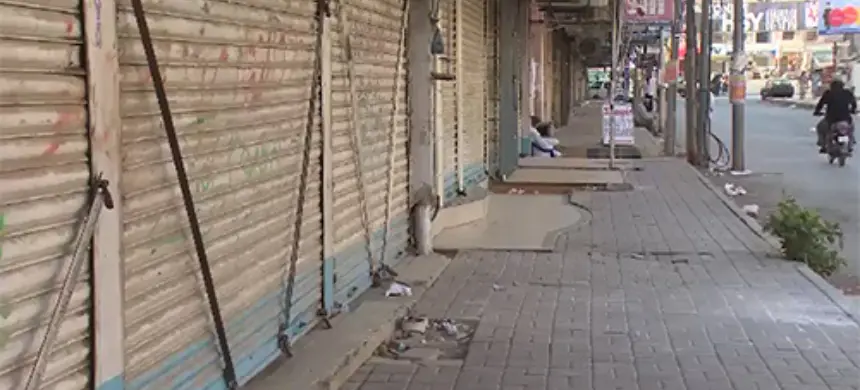A nationwide shutter-down strike has been launched by the business community across Pakistan to protest against rising sales and advance taxes, inflated electricity bills, and the Federal Board of Revenue’s (FBR) fixed tax policy. The strike, observed in multiple cities, has brought business activities to a halt, with traders demanding immediate relief from the government’s tax policies and soaring utility costs.
In Lahore, major commercial hubs such as Shah Alam Market, Azam Market, and Urdu Bazaar remained closed as traders protested the imposition of sales tax on stationery and other goods. The strike also extended to Akbari Mandi, where merchants shut their shops in opposition to the current tax regime. Protest banners were displayed throughout these markets, highlighting the traders’ dissatisfaction with government policies.
However, the Poultry Retailers Association opted not to participate in the protest, withdrawing from the strike. Despite this, the call for a strike gained significant support from political groups, especially Jamaat-e-Islami, which voiced strong backing for the traders’ demands. The party, led by Ahmed Salman Baloch, announced plans to set up strike camps in various markets, including Liberty Market and Hall Road Market, to strengthen support for the business community.
Read More: Rural Islamabad to Embrace Green Energy 100 Schools to Be Solarized Within 10 Weeks
In Gujranwala, a shutter-down strike was observed in response to the central traders’ organization’s call against rising electricity and gas prices and the implementation of withholding tax. Business centres in areas like Satellite Town, Cloth Market, Jinnah Bazaar, and others were found closed, with banners displayed across the city denoting the strike.
In Rawalpindi, traders also observed a strike against the Tajir Dost Scheme and other taxes, with all markets and shops across the city closed. The traders’ associations expressed their frustration over inflation, illegal taxes, and increased electricity bills, warning that the strike could be expanded if their demands are not met.
Karachi, the country’s largest city, witnessed a complete shutdown of business activities. All small and large markets, including Liaquatabad, Joria Bazaar, and Tariq Road, among others, were closed as traders protested against expensive electricity, increased taxes, and unfavourable contracts with independent power producers (IPPs).
In Balochistan, the strike extended to Quetta and other cities like Harnai, Loralai, and Chagai, where traders demanded the abolition of the Tajir Dost Scheme and reductions in the taxes embedded within electricity bills. Protests were also reported in these areas, with shops closed in response to increased taxation, inflation, and rising utility costs.
Read More: Nationwide strike over tax and electricity bill hikes
Khyber Pakhtunkhwa also saw a complete shutter-down strike in Swat district and Malakand, with all major business centres, including medical stores, hotels, and industries, closing their doors. The strike significantly reduced traffic in these regions.
Similar scenes unfolded in Abbottabad and Havelian, where commercial centres remained closed in protest against expensive electricity and taxes. Trade organizations planned to hold demonstrations at various locations, amplifying their discontent with the government’s economic policies.
The widespread strike highlights the growing frustration within Pakistan’s business community over government tax policies and high electricity costs. As traders across the country unite in their demands for relief, the government faces increasing pressure to address the concerns of this crucial economic sector.











